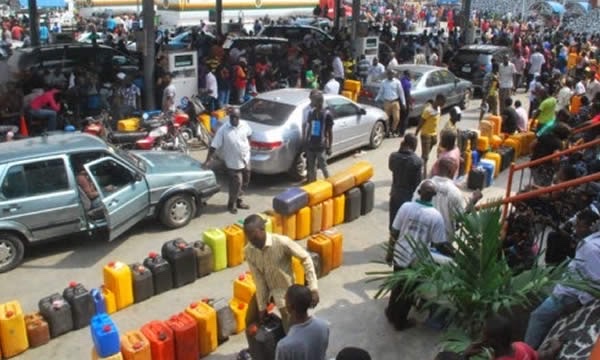Lagos, Nigeria’s bustling metropolis, is grappling with a severe fuel scarcity, leaving motorists stranded in endless queues at filling stations across the state. Despite the National Association of Road Transport Owners (NARTO) calling off its strike, the situation remains dire.
The queues began forming on Tuesday, triggered by fears among Nigerians that premium motor spirit might become scarce following the now-suspended NARTO strike. This panic buying frenzy intensified on Tuesday and Wednesday, exacerbated by the tanker drivers’ refusal to lift fuel, which subsequently depleted the supply at filling stations, including those operated by independent marketers.
Major areas of Lagos, such as the Alausa axis, witnessed long queues at filling stations like Mobil, Total, and Conoil. Even Nigerian National Petroleum Company Limited stations in Ogunnusi, Ojodu-Berger, and Ikorodu Road faced similar queues, alongside Bovas stations.
In Isolo, the scarcity was palpable as stations like Apata Roundabout and Total near Isolo General Hospital remained shut, with no fuel available. NPOG filling station at Ishaga had run out of fuel for three consecutive days. The situation was no different at NNPC and Mobil stations at the College Bus Stop.
Only Quest fuel station along Asuani Road managed to dispense fuel, albeit with a long queue of vehicles and customers willing to pay N640 per liter. Gbagada Road also faced fuel scarcity, with NorthWest station selling at N610 per liter, while Eternal station at Gbagada Bus Stop remained closed.
In Ikotun, a visit to an NNPC filling station revealed no fuel available, while God’s Decision station along Governor Road witnessed long queues on Wednesday.
The scarcity has left Lagosians frustrated and disillusioned. Many took to social media platforms to express their grievances, lamenting the inconvenience and hardship caused by the fuel crisis. Some even resorted to trekking long distances due to the unavailability of fuel for their vehicles.
Despite assurances from the Vice National President of the Independent Petroleum Marketers, Hammed Fashola, that the situation would normalize by Monday, the effects of the scarcity continue to be felt across the state.
The scarcity has disrupted daily routines, with commuters stranded and motorists forced to navigate through the chaos. In the scorching heat of Lagos, the search for fuel has become an arduous task, leaving many questioning the sustainability of Nigeria’s energy policies and infrastructure.
As the queues persist and frustrations mount, the people of Lagos can only hope for a swift resolution to this crisis, praying for relief from the turmoil that has gripped their city.


